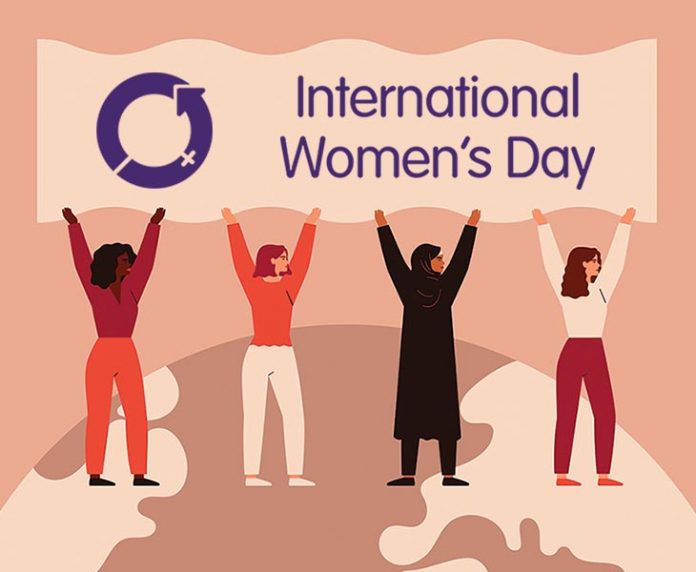International Women’s Day was born out of a group of women workers who decided to rise up in the early 1900s against inequality, disenfranchisement, and lack of rights for women in the United States. The fifteen thousand women who reportedly marched in the streets of New York City in February 1908 demanding equality, could be said to have paved the way for women around the world.
Similar movements and marches followed in Europe and elsewhere. In 1975, the year the United Nations celebrated as International Women’s Year, the global body recognized 8 March as International Women’s Day. In the following years the UN began adopting annual themes for the day; this year’s theme is ‘Gender equality today for a sustainable tomorrow’. The theme calls for recognizing the contribution of women and girls around the world, who are leading the charge on climate change adaptation, mitigation, and response, to build a more sustainable future for all.
For its part the International Women’s Day, an online platform that helps forge positive change for women everywhere, had last year selected the theme #ChoosetoChallenge, where we were asked to make a choice by challenging and calling out gender bias and inequality. The campaign also encouraged us to seek out and choose to celebrate women’s successes and achievements.
But if we are to set out and ‘choose to challenge’ then there is much to challenge. The women workers of New York broke convention and challenged the status quo.
What are we to challenge here in Kuwait? What is worth marching out for? What struggles do we take to the public sphere? What are our priorities? We must look beyond the veneer that just because women in Kuwait got their suffrage,t we now have equal rights. The struggle goes much deeper than mere votes. We have still not had a fair share of representatives in the National Assembly. The last elections were a defeat in the name of Kuwaiti women.
Our laws need massive revision and others outright elimination, for several articles explicitly discriminate against women. We, as women, have a lot to do to receive equal health services for example. The bylaws at the Ministry of Health discriminate against women. Single women have no right to demand for basic gynaecological examinations, while married women cannot undergo any procedure without the consent of their husbands. In the education sector, mothers are not considered an authorized signatory for their children. Kuwaiti mothers married to foreigners still cannot pass citizenship to their children. And domestic violence is still very prevalent.
But International Women’s Day when celebrated in Kuwait is not just about Kuwaiti women. It is a day to think of and appreciate all women. I think here of migrant women workers who have left their families behind, who struggle by putting others first, who suffer in silence and who persist despite all the dire conditions. When we meet these women, whether they are baristas, saleswomen, cashiers, nurses, manicurists, and domestic workers, they smile and greet us hiding behind unimaginable anxiety and anguish. They are strangers in a land they know will be a temporary stay for them. They will either return when their time is up, or continue to tread the path in the migration chain.
I also think of the stateless women who want nothing more than to be recognized as human; a human who deserves to belong to a community.
A human who has the right to education, health and equal and secure job opportunity. I think of stateless mothers who live in torment worrying about the future of their children, and trying hard to make their unlivable conditions liveable. Stateless women face a higher risk of domestic violence as well as community violence; their struggle with the patriarchy is far more than we can ever conceive of.
That the exploitation and oppression of women across the world still thrives means that we are perhaps centuries away before standing on an equal footing with our male counterparts; before dismantling gender bias; before demolishing the roots of the patriarchal systems; before needing to remind the world that women exist and have an assigned day to celebrate them. We, as women, have a lot of work ahead of us and it is not a smooth road but it is necessary for us to tread and march on.
On this day then, we must celebrate, honor, protect, and stand in solidarity with all migrant and stateless women. They are our sisters and our struggles are one. We must honor, protect and support victims and survivors of domestic violence, migrants, stateless and citizens. To eliminate gender-based discrimination, we need to first eliminate discrimination amongst us as women. It is time that women across Kuwait unite!

Shaikha Al-Hashem
Special to The Times Kuwait
Shaikha Al-Hashem is a writer and researcher from Kuwait focusing on women, migrant workers and the political economy. Shaikha is also a PhD Candidate in The European Graduate School, in the Philosophy, Art and Critical Theory (PACT) Program. Her specialization is in women and gender studies. She tweets @AlHashemShaikha

















